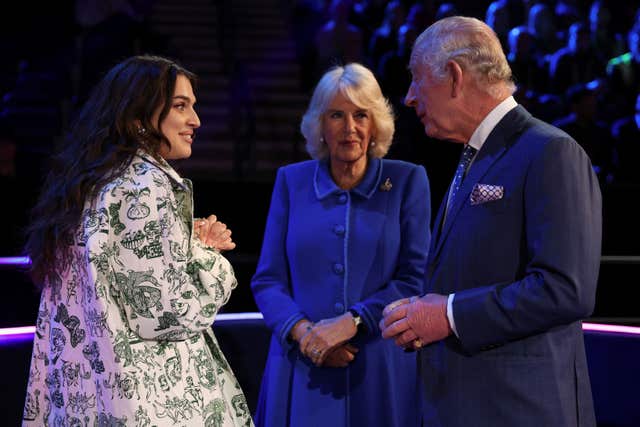Mae Muller: Training for Eurovision has been ‘like bootcamp’
The 25-year-old singer will represent the UK at the song contest in Liverpool in the grand final on May 13 with her track I Wrote A Song.

Mae Muller has said her training for Eurovision has been “like bootcamp” as she reflected on the challenges of being an up-and-coming artist in the music industry.
The 25-year-old singer will represent the UK at the song contest in Liverpool in the grand final on May 13 with her track I Wrote A Song, which features tongue-in-cheek lyrics about a cheating ex-boyfriend and a propulsive dance beat.
In an interview with The Sunday Times, Muller admitted she is keen to do well in the competition but that it has been “non-stop for two months”, describing it as “like boot camp”.

The London-born singer was confirmed as the UK’s Eurovision act in early March and has since been at a number of Eurovision events ahead of the big day including meeting the King and Queen.
Muller joined the royal couple when they unveiled the contest’s spectacular stage in Liverpool, with Charles telling her: “We will be watching you with great interest – egging you on.”
She also has pressure following in the footsteps of Sam Ryder who came in second place last year with his uplifting pop song Space Man, giving the UK its best result for more than 20 years.
His success meant the UK was chosen to host this year’s competition on behalf of war-torn Ukraine as it continues to face the Russian invasion.
Alongside these pressures, Muller also reflected on how the evolution of the music industry towards streaming and viral moments has added extra strain.
She told the newspaper: “My label said not to rush. I came just before TikTok was a thing, so I didn’t need viral success overnight.
“They wanted to develop me and that is a dying idea because after TikTok took over it’s all about how fast you can go. That’s sad.
“The whole point of a label is to give you time, but now they don’t sign anyone unless they’ve had a viral hit already.”
She added: “It’s no longer: ‘My song is on the radio. I’ve made it.’ There are a lot of boxes to tick.
“It depends on what your version of success is, but it is weird. I’m sat at home with seven million monthly listeners and think: ‘But how well is it actually going?’ It can be jarring.”
The singer did experience a viral moment with her 2021 track Better Days which climbed the charts after it became popular on TikTok as part of a challenge, which helped boost its streams to more than a million across all platforms.
Despite the challenges, she does feel that things are changing within the industry to allow women to be more vulnerable.
“Music is about what sells and labels are a business. It used to be: ‘Sex sells. Nobody wants to hear about crying and feeling.’ But it is changing”, she said.
“I wanted to be honest about my vulnerability. Women are told, especially in music, that we have to be a good role model. But you don’t have to be that all the time.”





